Teens face many challenges – changes to their bodies, friendship and relationship pressures, and exam stresses. And it’s totally normal for them to feel anxious about things like this. But if your teen seems to be constantly overwhelmed, struggling with sleep due to worry, or worn out by anxiety then something more serious may be going on. Here we look at how you can tell the difference between everyday worries and more serious anxiety, how you can support your teen through this and where you can get help and support.
What is anxiety?
We’ve all experienced anxiety at some point. It’s a feeling of worry, unease or nervousness. It can give us ‘butterflies’ in the stomach, a tight throat, or make the heart beat faster. Sometimes it’s caused by something specific, like meeting new people, going to the dentist, starting a new job or our kids starting nursery or school – we all get anxious about different things.
Usually once the things we’re worried about are over and done with, we feel okay again. Sometimes there isn’t a particular reason for being anxious, but the feeling passes after a while.
But sometimes anxiety just won’t go away. We get stuck feeling tense, nervous, uncomfortable and on edge, even if there doesn’t seem to be anything to be anxious about. Or the things we’re anxious about – like money worries, being bullied, or worrying about someone in your family who’s ill – don’t go away and the anxiety continues to build up. Anxiety like this can become overwhelming, and can stop us from doing everyday things like sleeping, eating or going out.
What's the difference between anxiety and stress?
Stress is our body’s natural response to change or things that we see as threats. It comes from the body’s ‘flight or fight’ warning system that protects us from danger. It is natural, caused by adrenaline and is there to help keep us safe from real danger.
A little bit of stress can be a good thing. It gives us a rush of energy that can help us cope with difficult situations. For example, if your teen is feeling a bit stressed about their exams, this may encourage them to work harder. But too much stress over a long period of time isn’t good for anyone.
Anxiety can be caused by stress, particularly if we don’t have any control over the things that are causing us stress. This is one reason why the Covid-19 pandemic was so stressful for a lot of people. Sometimes after the thing we are stressed about has gone, anxiety can remain.
Why do teens get anxious?
Teenagers face constant change as their bodies develop and they encounter new challenges, like exams, relationships and peer difficulties. Significant life events (like a family member with a serious illness) can also cause anxiety. All these things can make them anxious. Being online a lot and feeling as if they need to be constantly switched on and available may also contribute to this.
How can I tell if my teen's anxiety is serious?
Anxiety can affect us in lots of different ways. It can affect our thoughts and emotions, how we feel physically and how we behave. Your teen may tell you that they are ‘fine’ but there are some telltale signs to look out for.
They may experience physical symptoms that don’t seem to go away, including:
- feeling shaky or sick, or getting stomach pains
- not sleeping well (finding it hard to get to sleep or waking a lot during the night)
- feeling tense and fidgety and not being able to concentrate
- having a tight throat and feeling they cannot swallow
- going to the toilet more often
- having panic attacks.
Although you can’t read their mind, you may notice that they seem:
- scared
- negative about everything
- unable to cope
- overwhelmed
- tearful and upset more often than usual
- overly worried about the future.
And you may notice changes in their behaviour. For example they may:
- withdraw from the family and/or their friends and spend more time alone
- feel unable to go to school
- avoid social situations like parties
- eat more or less than usual
- avoid activities or sports they used to enjoy
- get angry more quickly and more often
- self-harm.
If you notice any of these signs, it doesn’t necessarily mean your teen is struggling with anxiety. But it’s still a good idea to talk to them and encourage them to find ways to help them cope with their feelings, so they don’t get out of control. Our page on talking and listening to your teen has advice on how you can persuade them to confide in you.
What the professionals say
In this short video, Child Psychologist Professor Cathy Richards discusses why teens can feel anxious and how you can help them feel better.
Tips to help teens keep calm and relax
One way of coping with anxiety is to try and deal with the physical symptoms by encouraging our bodies to calm down and distracting our minds. Here are some tips you can try with your teen. Neurodivergent teens might benefit from different approaches. ave a look at our page on neurodivergent teens and anxiety for more tips.
Tip #1: Try some breathing exercises together
Your teen may not think something simple like breathing exercises can help, but they can really help you feel better. You can find lots of different exercises on the NHS Inform website so maybe have a look together and see what works for your teen.
Tip #2: Practise grounding techniques
‘Grounding’ is a way of calming yourself by connecting to the present moment. Here are some things you and your teen can try together:
- One simple way to ground yourself is to sit quietly and list off five things you can see, four things you can touch, three things you can hear, two things you can smell and one thing you can taste.
- Another trick is to imagine you are in a special, safe place you love, and to describe it to yourself or to each other in detail. Describe the smells, the temperature, the memories you can remember.
- Sitting still or lying down, try doing a body scan. Start by focusing on your toes. How do they feel? Can you relax them? Then move to your feet, ankles, knees and so on up the body. By the time you get to the head you may well feel more relaxed.
Tip #3: Suggest they make a 'calm box'
A calm or self-soothe box contains things that can help your teen ground themselves. It can include things like fidget toys or puzzle books to distract them, photos of happy memories, calming essential oils and cards with breathing exercises on. It doesn’t need to be a box – it could be a carrier bag!
You could help your teen decide what to put in the box by chatting about the kind of things that help them keep calm. Some of the items could just remind them of things that help them feel grounded – for example, they could put some headphones in the box to remind them that listening to music helps them relax.
You can find out more about how to make a self-soothe box on the YoungMinds website.
Tip #4: Explore mindfulness
Mindfulness can help us become more aware of our thoughts and feelings. This can allow us to get better at spotting the signs that we may be feeling anxious, before these feelings become overwhelming.
Mindfulness isn’t for everyone, but it’s another tool you and your teen could explore together to help cope with anxiety. If your teen is always on their phone, you could put this to good use by suggesting they check out a mindfulness app like Calm or Headspace.
You can find out more about mindfulness on the NHS Inform website.
Tip #5: Encourage them to get some exercise
Mindful exercise like yoga and tai chi can be great for calming anxiety, but all exercise is good for lifting the mood. So whatever your teen is into, try to encourage them to keep moving, whether that’s at home with the help of YouTube, outside in the fresh air or as part of an organised sport. Our page on tips for teens to get outdoors and get active has lots of suggestions.
Tip #6: Help them find an activity they can enjoy
As kids move into their teens they often give up on creative activities they enjoyed when they were younger, like playing music, singing, dancing, baking, drawing, sewing or colouring in. Try to encourage them to give these hobbies another go, as they may well find that focusing on an activity like this will help take their mind off their worries. Our page on things for teens to do has some suggestions they could try.
Tip #7: Make a list of things that help them feel better
It’s great for your teen to have a list of the things that help them feel better, so if they start to feel anxious they can try to stop it in its tracks. This could include any of the tips above, or could be as simple as video-calling a friend, going for a walk, kicking a ball about outside, playing with a fidget toy, watching a favourite film or listening to their favourite music.
This list will be different for everyone, and the things your teen finds relaxing may not be what you find ‘calming’ at all – they may be active and loud, like boxing or listening to heavy metal music!
Tip #8; Help them get a good night's sleep
Teenagers’ body clocks are automatically set to stay up late and sleep in in the mornings. But if they need to get up early, they may not be getting enough sleep, which isn’t good for anyone. If they’re feeling anxious, they may find it even harder to nod off. Our page of sleep tips has ideas to help teens get into a good, calming routine in the evenings that may help.
Tip #9: Encourage them to cut down on caffeine
Too much caffeine can actually make us feel anxious and on edge, so encourage your teen to go easy on things like energy drinks, tea and coffee. Chocolate also contains caffeine so avoiding that too is helpful.
Tip #10: Suggest they take a screen break
Spending a lot of time online can heighten your teen’s feelings of anxiety. Seeing people who appear to have perfect lives, feeling judged and feeling as if they need to be available 24/7 can all take its toll. So it’s a good idea to have a chat with them about unfollowing or blocking anyone who makes them feel anxious or bad about themselves. Our tips for making the most of social media have more advice for protecting themselves from things like this and you could also suggest your teen has a look at the Mind Yer Time website, which has tips from young people for using screen time positively.
It’s also a good idea to encourage them to switch off every so often and do something that doesn’t involve their phone, like going for a walk, going swimming, going to the cinema or playing a board game.
Tips for helping your teen cope with anxiety
As a parent, it’s natural to want to protect your child from everything. And one of the hardest things to accept as they grow up is that we can’t always do this. Instead, the best thing we can do for them is to help them cope with their fears and worries themselves. There are lots of tips here so you can pick a couple to try and see how you get on. You can always bookmark this page and come back to it later on if you want to try something else.
If your teen is neurodivergent these tips may not be suitable so please have a look at our tips for neurodivergent teens here.
Tip #1: Listen
One of the best things you can do is really listen to what your teen has to say. Just getting things off their chest may help them to feel better. So try to give them your full attention (phones away!) and don’t dismiss what they have to say. Try not to offer any solutions and just help them feel heard.
Tip #2: Help them find ways to express themselves
Your teen may find it hard to tell you how they’re feeling. But there are lots of other ways they can explore their thoughts and emotions. For example, they could try:
- drawing their worries using colours, shapes and symbols
- writing in a journal
- making a mindmap, with the word ‘anxiety’ in the middle and other words they associate this written around it
- drawing an anxiety iceberg
- drawing a stress bucket.
They may find that simply getting their worries down on paper will make them feel a bit better.
Tip #3: Make a worry box
Your teen could even try putting their mindmap or drawing away in a ‘worry box’, so their problems are ‘held’ outside of their head and they’re not carrying them around anymore. You can find out more about making worry box on the YoungMinds website.
Tip #4: Help them reframe their worry as a strength
Your teen may hate feeling anxious, but you can help them to see that it can also be a superpower. For example:
- If your teen is always imagining the worst, you could ask them to use their imagination to picture the best that could happen.
- If they’re constantly overthinking things, you could suggest they use these analytical skills to think of ways to solve their problems, rather than just worrying about them.
- If they worry about what other people think about them, this shows that they are sensitive to how other people feel, which is a great skill to have.
- If they feel nervous and jittery before events, you could point out that these are similar to the feelings we get when we’re excited. Labelling these feelings as excitement may help them reframe the upcoming event as something to look forward to.
Tip #5: Suggest they try gratitude journaling
Gratitude journaling sounds fancy but it’s really just the habit of writing down things in life that we’re grateful for. There’s no right or wrong way to do it – your teen may want to scribble things down on a piece of paper, use an old exercise book, download a free template or use an app. It’s a great habit to get into because it helps us focus on positive things that make us happy rather than dwelling on things that worry us.
Tip #6: Try not to let them avoid the things they're anxious about
Seeing your teen anxious can be really upsetting, and it may be tempting to let them swerve the thing that’s worrying them. But avoiding things can lead to the worry becoming even bigger in their head, and could end up with them missing out on valuable experiences and feeling isolated and lonely.
Also, if they get used to avoiding everything that scare them, they won’t build up the skills they need to face challenges. This means that difficult things like exams and job interviews will seem even harder for them.
So try to encourage them to take baby steps to face up to things that scare them.
Tip #7: Help them break the cycle of anxiety
If we’re anxious about something, we tend to build it up in our heads as being worse than it really is, and we then underestimate our ability to face it. We tell ourselves ‘it’ll be a nightmare’, ‘I can’t cope’. This worry can affect us physically, making us tense, breathless, uncomfortable and unable to relax. It then affects our behaviour, so we start avoiding the things that we’re anxious about. This in turn makes the action or event we’re worried about seem even worse, and so the cycle continues.
The good news is, there are ways you can help your teen break this cycle:
- Help them replace unhelpful thoughts with helpful ones. For example, if they’re worried about something at school, like having to do a presentation or an exam, remind them that they can cope, and that by the end of the day it’ll be over and they can come home and do something fun. Another example is if they say something like ‘everybody hates me’ ask them if this is really true – because it won’t be!
- Use some of the tips above to help them relax. This will help them manage the physical symptoms of anxiety.
- Suggest a way they can change their behaviour that helps them cope with the thing they’re worried about, rather than avoiding it altogether. For example, if they’re worried about going to a social occasion like a party, suggest they arrive early when fewer people are there, or meet up with a friend beforehand.
Working on this together will help them learn to break the cycle and manage their anxiety themselves.
Tip #8: Problem solve together
Rather than rushing in and solving your teen’s problems for them (for example, by letting them avoid the thing they’re dreading) try to encourage them to explore ways to make things better. It’s best if you let your teen lead the conversation – so rather than suggesting solutions straightaway you could ask them questions like ‘How did you cope with last time?’ or ‘What could you do to stop feeling this way?’
Tip #9: Try to limit the amount of time you spend talking about their worries
Getting your teen to open up to you is fantastic, but you don’t want every conversation to be dominated by their worries, as this may make them seem even bigger and more significant. Also, if you’re constantly reassuring them, this may lead to them relying on you to calm their worries, rather than dealing with them themselves.
For example, if they’re worried about going into school, try not to speak to them about it too much, especially late in the evening or when they get up. Instead you could try some of the relaxation tips above to help them feel a bit better and take their minds off their worries.
You might want to set aside some time each day to talk about their worries and problem solve, and then try not to talk about it outside that time.
Tip #10: Help them see they are not their anxiety
Try to always talk about their anxiety as something separate to them. So instead of saying ‘Are you worried about going into school?’ you could say ‘Is anxiety making you want to stay at home?’ Some people find it helpful to give their anxiety a name, as if it’s an annoying person they want to shake off.
Where to get help and support
If your teen’s anxiety isn’t going away and is stopping them from getting on with their life then you may need to get in touch with your GP for further help and advice. You could also try talking to your teen’s guidance teacher. Talk to your teen about this first though, so they don’t feel that you’re making decisions without them.
Our page on getting support when you’re raising a teen lists more organisations that can help.
Further information
This page on the YoungMinds website has good advice on helping your teen manage their anxiety.
For a more in-depth look at how you can support your teen’s mental health, you can sign up for a free course from NHS Scotland and SilverCloud. You can find out more about the Supporting an anxious teen course here and sign up for free using the code Scotland2020.
 Activities & Play
Activities & Play Behaviour
Behaviour Childcare
Childcare Development & Growing Up
Development & Growing Up Family, Friends & Relationships
Family, Friends & Relationships Feeding Your Baby
Feeding Your Baby Food & Eating
Food & Eating Health & Safety
Health & Safety Mental Health & Wellbeing
Mental Health & Wellbeing Money & Work
Money & Work Online Behaviour & Safety
Online Behaviour & Safety Pregnancy & First Days
Pregnancy & First Days School & Education
School & Education Sleep
Sleep

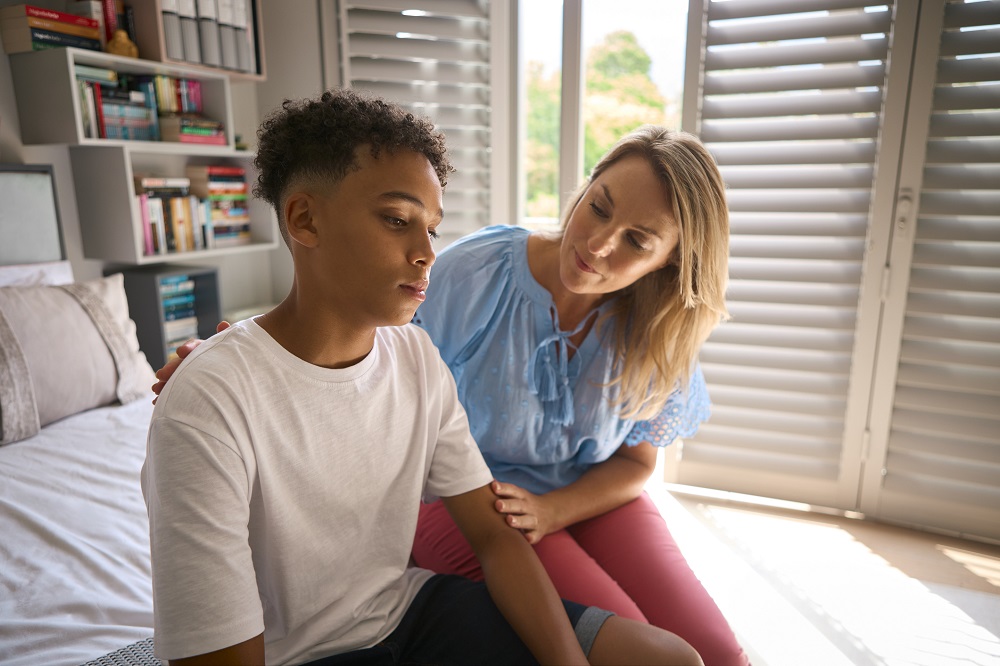
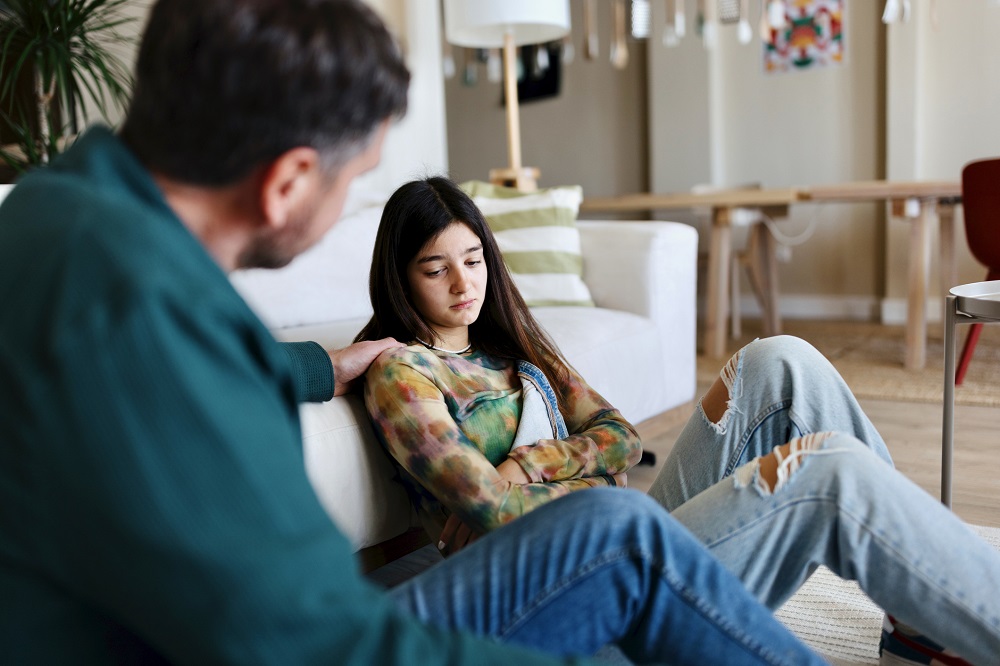
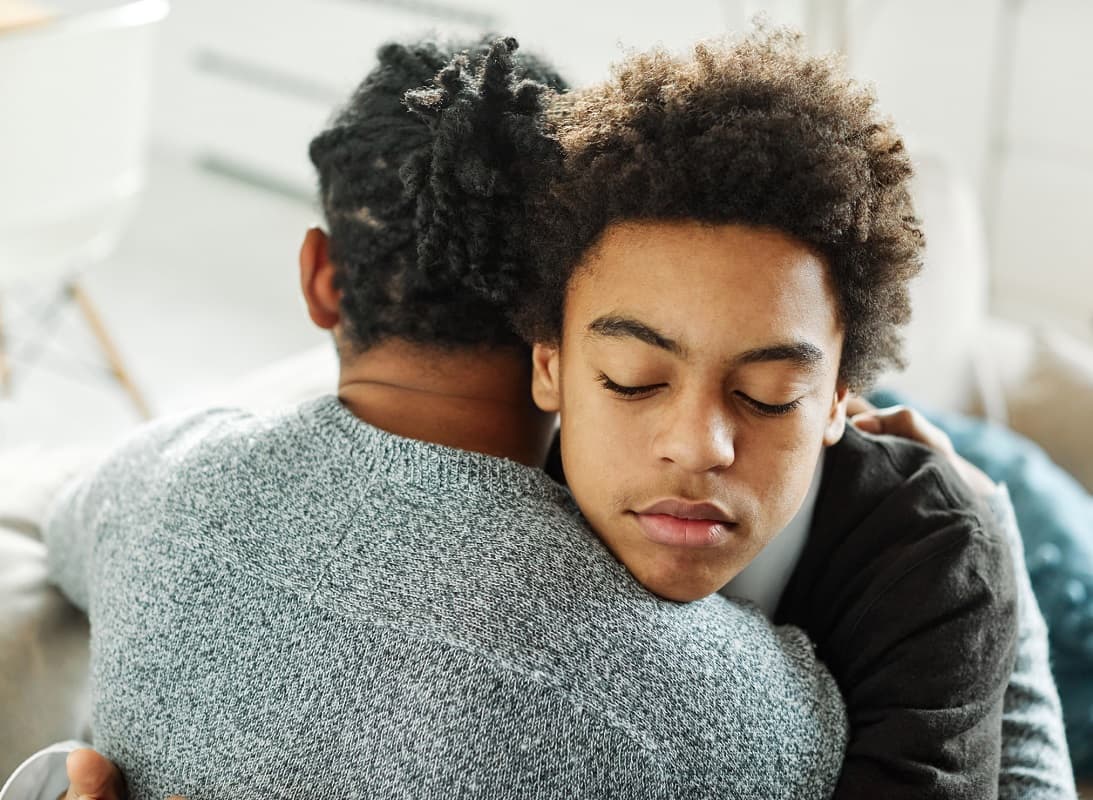
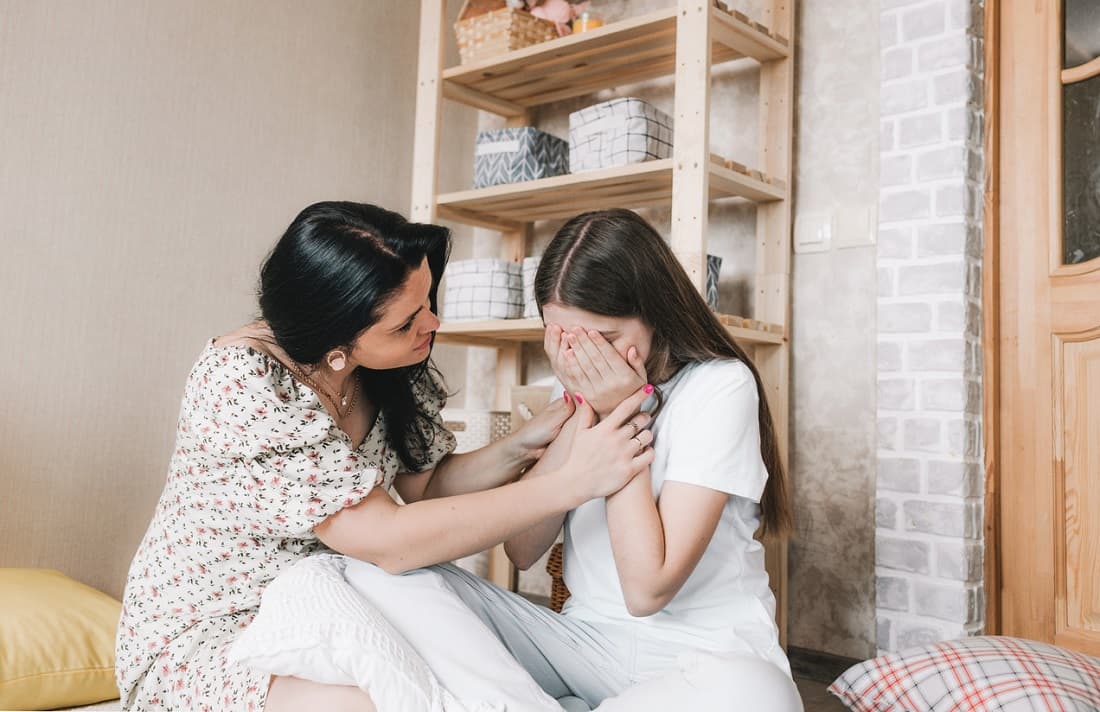
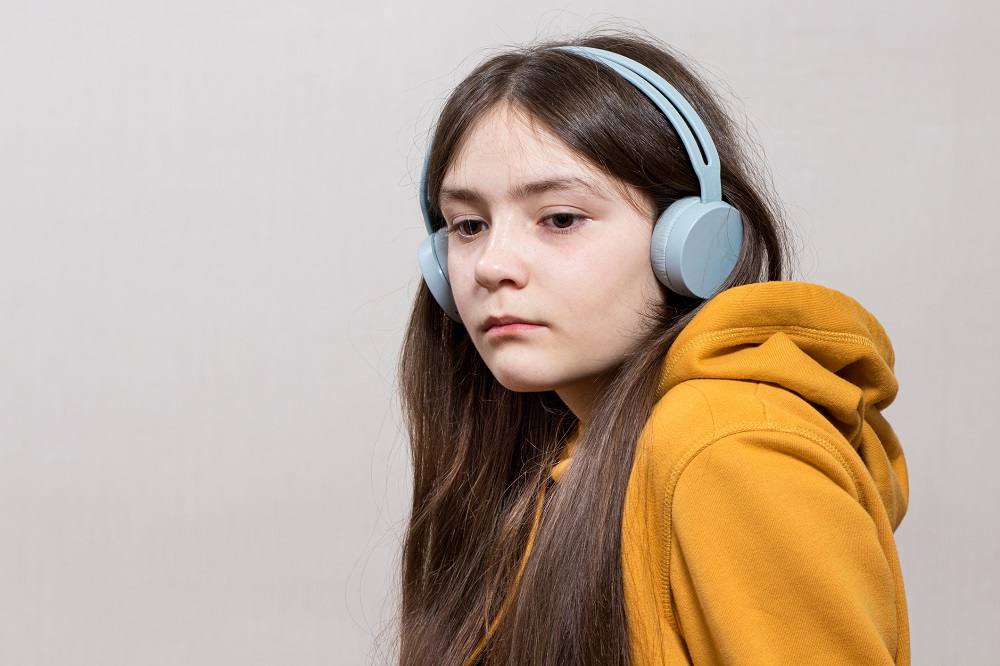


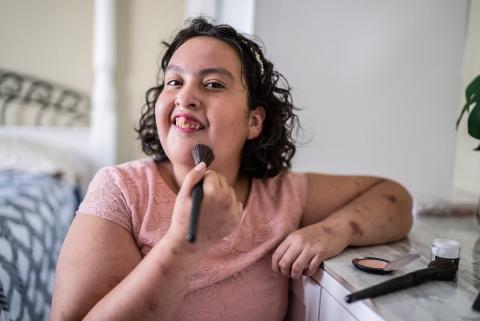

 Behaviour
Behaviour
 Family, Friends & Relationships
Family, Friends & Relationships